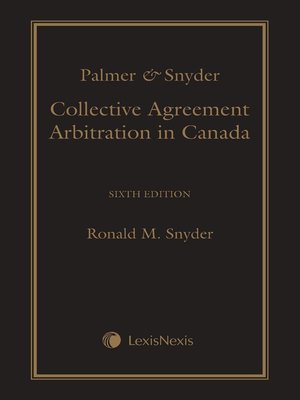
Sign up to save your library
With an OverDrive account, you can save your favorite libraries for at-a-glance information about availability. Find out more about OverDrive accounts.
Find this title in Libby, the library reading app by OverDrive.



Search for a digital library with this title
Title found at these libraries:
| Library Name | Distance |
|---|---|
| Loading... |
"... Collective Agreement Arbitration in Canada provides a practical approach to issues which practitioners in the labour relations field will find most useful. That it is cited by all levels of court, including the Supreme Court of Canada, is a testament to the high value attached to this work by the courts and those involved in the field of labour law ... There is no issue pertaining to the subject matter of labour relations that is not expertly addressed in this text and it is apparent that no matters that have been touched by legislation or arbitral or court rulings have been omitted. This is a handbook that everyone in this field should have at his or her fingertips ... I enthusiastically recommend this 6th edition of Collective Agreement Arbitration in Canada. It will be valued by practitioners, arbitrators and judges as well as by students and academics for a clear and readable exposition of complex subjects."
The Honourable Marshall Rothstein, C.C., Q.C., Supreme Court of Canada (2006-2015)
(From the Foreword)
"
I highly recommend to those involved in labour relations in Canada to invest in the newest edition of Palmer and Snyder, Collective Agreement Arbitration in Canada, Sixth Edition, 2017.
This text is not simply an annotation of case law under various topics; rather, the author understands the underlying issues that recognize the most significant shift in arbitral jurisprudence since the 1960's and 1970's. This is due, of course, to the Supreme Court of Canada. All existing arbitral jurisprudence, must survive the lens of human rights legislation, as well as that of the Charter of Rights and Freedoms. Tortious conduct falling within the terms of a collective agreement is now within the scope of an arbitrator's jurisdiction. And Privacy is now central to employee rights. All of these developments impact the discipline of employees and the interpretation of collective agreements.
The author not only tracks these new developments but also recognizes the challenging issues that lay ahead.
This text is therefore an invaluable resource in seeking guidance to some of the most difficult labour law issues that the labour relations community in Canada currently face."
Stan Lanyon, Q.C., Arbitrator
"
The 6th edition of Collective Agreement Arbitration in Canada is a necessary resource for all practitioners. Covering recent developments in human rights, privacy, damages, substance testing, Charter and many other areas, this edition current to August 2017 is a valuable addition to any library.
The first edition in 1977 chose a different approach than simply digesting decisions in its effort to bring order to a growing body of arbitration decisions. Professor Palmer's approach was to recognize "Law itself interacts with society, party forming it, partly being formed by it." Codification should not stultify change. lt should foster growth and change.
This approach continues in the latest edition by Ronald M. Snyder.
The stimulating effect of this approach to codification is that it does not declare unequivocally what the 'law' is or should be. An example is a simple sentence in the chapter on Human Rights and Accommodation - 'There are no absolutes in accommodation.' All currently relevant considerations are canvassed.
The inclusion of excerpts from decisions and references to the evolution of arbitral thoughts about an issue reinforce the vibrancy of collective agreement arbitration.
Differing arbitral approaches to old and new issues are identified in the thematic approach to subject organization. Issues are animated by attempts to reconcile differing approaches or giving a rationale for preferring an...







